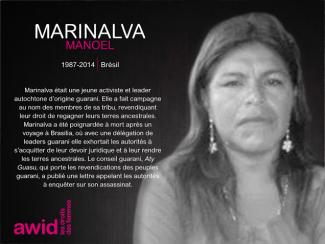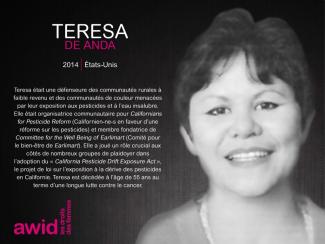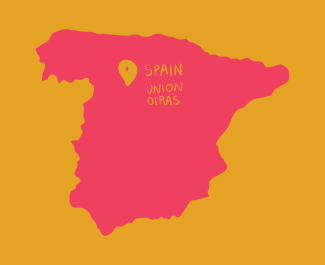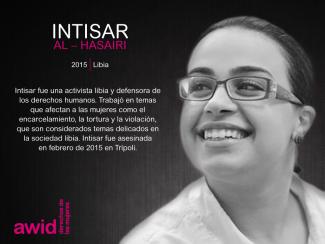
Marinalva Manoel

L’hommage se présente sous forme d’une exposition de portraits d’activistes du monde entier qui ne sont plus parmi nous qui ont lutté pour les droits des femmes et la justice sociale.
Cette année, tout en continuant à convoquer la mémoire de celleux qui ne sont plus parmi nous, nous souhaitons célébrer leur héritage et souligner les manières par lesquelles leur travail continue à avoir un impact sur nos réalités vécues aujourd’hui.
49 nouveaux portraits de féministes et de défenseur·e·s viennent compléter la gallerie. Bien que de nombreuses des personnes que nous honorons dans cet hommage sont décédé·e·s du fait de leur âge ou de la maladie, beaucoup trop d’entre iels ont été tué·e·s à cause de leur travail et de qui iels étaient.
Visiter notre exposition virtuelle
Les portraits de l'édition 2020 ont été illustrés par Louisa Bertman, artiste et animatrice qui a reçu plusieurs prix.
L’AWID tient à remercier nos membres, les familles, les organisations et les partenaires qui ont contribué à cette commémoration. Nous nous engageons auprès d’elleux à poursuivre le travail remarquable de ces féministes et défenseur·e·s et nous ne ménagerons aucun effort pour que justice soit faite dans les cas qui demeurent impunis.
« Ils ont essayé de nous enterrer. Ils ne savaient pas que nous étions des graines » - Proverbe mexicain
Le premier hommage aux défenseur-e-s des droits humains a pris la forme d’une exposition de portraits et de biographies de féministes et d’activistes disparu·e·s lors du 12e Forum international de l’AWID en Turquie. Il se présente maintenant comme une gallerie en ligne, mise à jour chaque année.
Depuis, 467 féministes et défenseur-e-s des droits humains ont été mis·es à l'honneur.

The United Nations (UN) Financing for Development (FfD) process seeks to address different forms of development financing and cooperation. As per the Monterrey Consensus it focuses on six key areas:
ما لم تكن هناك مشكلات في إمكانية الوصول و/أو إذا كنت تملأ/ئي الاستبيان بلغات أخرى، فإننا نشجعك بشدة على استخدام KOBO لجمع وتحليل البيانات الموحدة للاستطلاع.
Nuestro nuevo documento de investigación El diablo se esconde en los detalles aborda la falta de conocimientos sobre los fundamentalismos religiosos en el sector del desarrollo, y se propone comprender mejor de qué manera estos fundamentalismos inhiben el desarrollo y, en particular, los derechos de las mujeres. Propone recomendaciones para que quienes trabajan en temas de desarrollo desafíen la labor de los fundamentalismos y eviten fortalecerlos inadvertidamente. [CTA download link: Leer el documento completo]
| Graphic1 | 1. Control of women’s bodies, sexuality, and choice are “warning signs” of rising fundamentalisms. |
| 2. Neoliberal economic policies have a particularly negative impact on women, and fuel the growth of religious fundamentalisms. | Graphic2 |
| Graphic3 | 3. Choosing religious organizations as default for partnerships builds their legitimacy and access to resources, and supports their ideology, including gender ideology. |
| 4.Everyone has multiple identities and should be defined by more than just their religion. Foregrounding religious identities tends to reinforce the power of religious fundamentalists. | Graphic4 |
| Graphic5 | 5. Religion, culture, and tradition are constantly changing, being reinterpreted and challenged. What is dominant is always a question of power. |
| 6. Racism, exclusion, and marginalization all add to the appeal of fundamentalists’ offer of a sense of belonging and a “cause”. | Graphic6 |
| Graphic7 | 7. There is strong evidence that the single most important factor in promoting women’s rights and gender equality is an autonomous women’s movement. |
El Diablo se esconde en los detalles proporciona detalles de las graves violaciones a los derechos humanos y, en particular, de las violaciones a los derechos de las mujeres, causados por los fundamentalismos auspiciados por los Estados, así como por actores fundamentalistas no estatales como milicias, organizaciones comunitarias confesionales e individuos. La profundización fundamentalista de normas sociales atávicas y patriarcales está provocando el aumento de la violencia contra las mujeres, las niñas y las defensoras de derechos humanos (WHRDs). El informe propuesta estas ideas clave para abordar el problema:
Quienes trabajan en el desarrollo están de capacidad de asumir una posición más firme. Su capacidad colectiva para reconocer y enfrentar conjuntamente a los fundamentalismos religiosos resulta crucial para promover la justicia social, económica y de género y los derechos humanos de todas las personas en el marco del desarrollo sostenible. Resulta fundamental promover que el poder y los privilegios se entiendan desde la óptica del feminismo interseccional y aplicar esta comprensión a los interrogantes sobre religión y cultura. Las organizaciones de mujeres ya poseen conocimientos y estrategias para oponerse a los fundamentalismos. Quienes trabajan en el desarrollo deberían apoyarse en estos e invertir en coaliciones enfocadas en múltiples temáticas. Lo anterior, les ayudará a alcanzar nuevos horizontes.
Ana était un ardente défenseure des droits des femmes et travaillait avec un large éventail de femmes au sein d’organisations de terrain ainsi que dans le secteur privé.
Elle croyait en la construction de ponts entre les secteurs. Ana était membre du Réseau national de promotion de la femme (RNPM) et participait activement à l'élaboration de nombreux programmes sociaux traitant de questions telles que la santé et les droits sexuels et reproductifs.



The call for session proposal is now closed.
We launched a Call for Activities on November 19 2019 and the last date to receive proposals was February 14, 2020.
Find and create connections. There are over 9,000 AWID members, all working to address complementary, interconnected issues. This diversity supports the sustainability of feminist movements and actors.
Да, в конце опроса мы попросим вас поделиться более подробной информацией по важным для вас аспектам, ответив на открытые вопросы.
Learn more about Feminist Realities
Any questions? Please do not hesitate to contact us
Just like women have learned to avoid dark streets for their safety, women journalists are forced to avoid reporting certain stories as a result of online harassment.
Harassment is not part of the job description and should be called out and challenged at every turn to ensure these important voices are not silenced.
This tribute to journalists was made on behalf of IFEX


We will announce this soon. Stay tuned!
Nos solidarizamos unxs con otrxs, y con las distintas luchas por la justicia y las libertades. Procuramos movilizar y fortalecer la acción colectiva, y practicamos formas significativas de trabajar en conjunto.
Os dados serão processados para fins estatísticos para esclarecer o estado de financiamento dos movimentos feministas globalmente e serão divulgados apenas em forma agregada. A AWID não divulgará informações sobre uma organização específica ou informações que permitam identificar uma organização através da respetiva localização ou características sem o respetivo consentimento comprovado.
La cadre des Réalités Féministes du Forum repose sur six points d’ancrages thématiques. Chaque point d’ancrage met les réalités, les expériences et les visions féministes au coeur du continuum entre résistance et proposition, lutte et alternative. Nous cherchons à explorer ensemble ce qui constitue nos réalités féministes et ce qui leur permet de se répandre dans les différentes sphères de nos vies.
Ces réalités se manifestent sous forme de modes de vie pleinement articulés, de rêves et d'idées en devenir, ou encore d'expériences et de moments précieux.
Plus que des thèmes isolés, les points d’ancrage sont des conteneurs interconnectés à l’effet des activités du Forum. Nous prévoyons de nombreuses activités à l’intersection de ces thèmes, des différentes luttes, communautés et mouvements. Encore provisoires, les descriptions continuent d’évoluer au fur et à mesure que le parcours des Réalités Féministes se poursuit.
Ce point d’ancrage met l’accent sur la façon dont nous répondons à nos besoins fondamentaux et assurons les ressources qui nous sont nécessaires pour prospérer, en tant qu’individus, communautés et mouvements, d’une manière qui prenne soin des personnes et de la nature en priorité. Nous entendons par “ ressources ” l’alimentation, l’eau et l’air pur, ainsi que l’argent, le travail, l’information, la connaissance, le temps et autres.
S’appuyant sur la résistance féministe face au système économique d’exploitation et d’extractivisme, ce point d’ancrage met en lumière les propositions, expériences et pratiques féministes puissantes et inspirantes concernant l’organisation de notre vie économique et sociale. L’alimentation et la souveraineté alimentaire ainsi que les visions féministes du travail et des systèmes commerciaux justes et durables ne constituent que quelques-unes des questions qui feront l’objet de notre exploration. Nous ferons courageusement face aux contradictions qui émergent de la nécessité de survivre dans des systèmes économiques répressifs.
Ce point d’ancrage intègre le financement et le ressourcement pour les organisations et les mouvements dans une vaste analyse féministe de la justice économique et de la création de richesses. Il examine comment déplacer les ressources là où elles sont nécessaires, de la justice fiscale et du revenu de base à différents modèles de philanthropie et au ressourcement créatif et autonome des mouvements.
Nous cherchons à créer de nouvelles visions et à amplifier les réalités et les expériences existantes en termes de gouvernance féministe, de justice et de responsabilisation. Face à la crise mondiale et à la montée du fascisme et du fondamentalisme, ce point d’ancrage se concentre sur les modèles, les pratiques et les idées féministes, radicales et émancipatrices d’organisation de la société et de la vie politique, à l’échelle locale et mondiale.
Ce point d’ancrage explorera les aspects de la gouvernance, depuis les expériences féministes du municipalisme jusqu'à nos visions du multilatéralisme, en passant par la construction d'institutions situées à l’extérieur des États-nations. Nous échangerons nos expériences concernant les processus judiciaires et de responsabilisation au sein de nos communautés, nos organisations et nos mouvements, notamment les modèles de justice réparatrice, communautaire et transformatrice qui rejettent la violence étatique et le complexe carcéro-industriel.
En nous concentrant sur les expériences de voyages, de migrations et de refuges ainsi que sur l’organisation féministe, nous voulons un monde sans régimes frontaliers mortels; un monde où la circulation y est libre et les voyages passionnants.
Le rôle de la technologie dans nos vies ne cesse de croître et la frontière entre les réalités en ligne et hors ligne continue de s’estomper. Les féministes se servent largement des technologies et des espaces en ligne pour construire la communauté, apprendre les un-e-s des autres et mobiliser l’action. Grâce aux espaces en ligne, nous pouvons repousser les limites de notre monde physique. En revanche,, les communications digitales appartiennent majoritairement à des sociétés n’assumant qu’une part de responsabilité mineure vis-à-vis des utilisateurs-trices : l’exploration de données, la surveillance et les atteintes à la sécurité sont devenues la norme, de même que la violence et le harcèlement en ligne.
Ce point d’ancrage explore les opportunités et les enjeux féministes qui existent au sein des réalités digitales. Nous nous pencherons sur les alternatives qui se présentent face aux plateformes privées qui dominent l’horizon digital, ainsi que sur les stratégies de bien-être pour la navigation d’espaces en ligne et les utilisations de la technologie comme moyen de surmonter les problèmes d’accessibilité. Nous examinerons ce que la technologie peut apporter en termes de plaisir, de confiance et de relations.
Les réalités féministes règnent également en nous-mêmes: il s’agit de l’expérience incarnée. Le contrôle dont font l’objet notre travail, notre reproduction et notre sexualité est toujours au coeur des structures patriarcales, cis-hétéro-normatives et capitalistes. Face à cette répression, des personnes de genre, de sexualité et d’habiletés différentes organisent des rencontres, créent des espaces et conçoivent des sous-cultures destinées à la joie, à la sollicitude, au plaisir et à une profonde appréciation mutuelle et de soi-même.
Ce point d’ancrage explorera les idées, les récits, les inventions et les expressions culturelles du consentement, du pouvoir et du désir des femmes, des personnes transgenres, non-binaires, transexuelles et intersexuées dans différentes sociétés et cultures.
Nous échangerons des stratégies visant à obtenir les droits en termes de santé reproductive et la justice, et exposerons des pratiques sociales facilitatrices et respectueuses de l’autonomie, l’intégrité et la liberté corporelles. Ce point d’ancrage relie différentes luttes et différents mouvements afin de partager nos perceptions et nos expériences de ce que sont le bien-être et le plaisir.
Imaginez une planète féministe. Quel est le son de l’eau, l’odeur de l’air, le contact de la terre? Quelles sont les relations entre la planète et les êtres vivants, y compris les êtres humains? Les réalités féministes sont celles d’une justice environnementale et climatique. Les luttes féministes, autochtones, décoloniales et écologiques puisent souvent leurs racines dans des visions transformatives ainsi que dans la relation entre la nature et les êtres.
Ce point d’ancrage se concentre sur le bien-être de notre planète et s’interroge sur les façons dont les êtres humains ont interagi avec elle et l’ont transformée. Nous voulons explorer les aspects des savoirs traditionnels et de la biodiversité dans le cadre de la préservation d’une planète féministe, et acquérir des connaissances sur les pratiques féministes dans le domaine de la décroissance, la pratique des communs, les modèles d’économies parallèles, l’agro-écologie et les initiatives en termes de souveraineté alimentaire et énergétique.
Bien que nous considérions tous ces points d’ancrage comme étant reliés, celui-ci est véritablement transversal; nous vous invitons donc à ajouter une dimension organisationnelle à tous les points d’ancrage auxquels les activités que vous proposez sont liées.
Comment se déroule l’organisation féministe dans le monde aujourd’hui? Cette question porte notre attention sur les acteurs, la dynamique du pouvoir, les ressources, le leadership, les économies dans lesquelles nous sommes intégré-e-s, notre compréhension de la justice et de la responsabilisation, l'ère numérique et les expériences que nous faisons de l'autonomie, du bien-être et des soins collectifs. Nous espérons, à travers tous ces points d’ancrage, créer un espace de réflexion sincère autour de la répartition du pouvoir et des ressources et de la négociation au sein de nos propres mouvements.
Le Forum se veut bien plus qu’un événement de quatre jours. C’est un arrêt de plus dans un parcours de renforcement de mouvement autour des réalités féministes, lequel a déjà commencé et continuera bien au-delà des dates du Forum.
“[She] was a person who was characterized by her hard work in favor of the defense of human rights and the construction of peace in Nariño, especially in the municipality of Samaniego-Nariño.”
- Jorge Luis Congacha Yunda for Página10
She focused on civil and political rights, issues of impunity and justice, and contributed to uncovering the abuse of power, including corruption. She also participated in peacebuilding projects in her hometown Samaniego, such as the Municipal Peace Council and the Municipal Women’s Board.
Paula received death threats after exposing the irregular handling of resources and complaining about acts of corruption at the Lorencita Villegas Hospital in the Nariñense municipality. She was murdered on 20 May 2019, when two men approached and shot her at close range.
